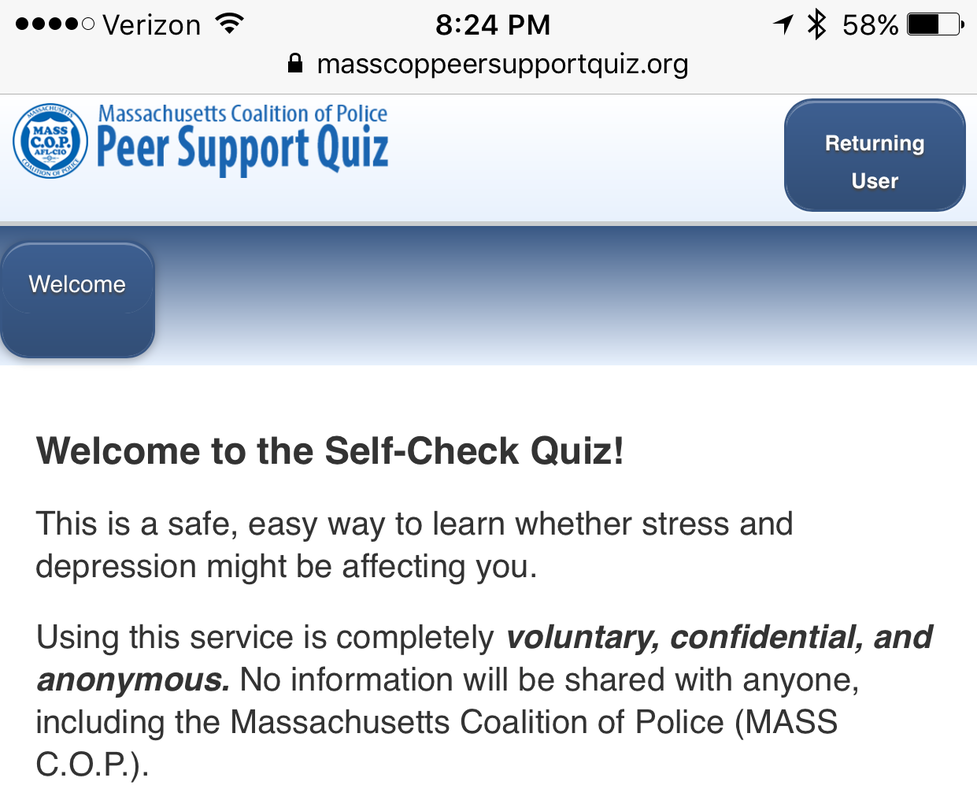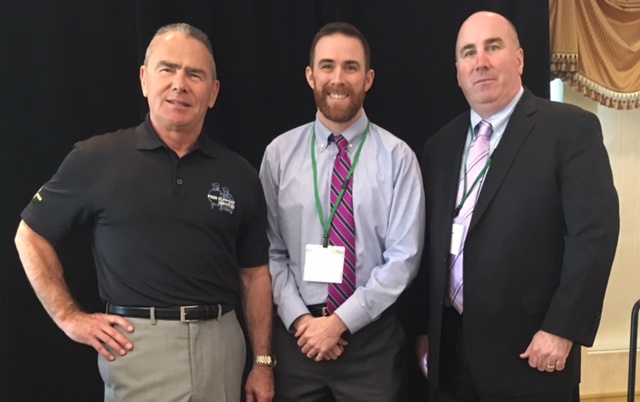Peer Support Services, American Foundation for Suicide Prevention Launch Statewide Self Check Quiz for MASSCOP
On Friday March 31, 2017, MASSCOP launched the first statewide "self-check quiz" for it's members. The quiz is a confidential (I will address how confidential later) online tool where an officer can log on using his or her own username and password (we suggest that they have no inference to you) and take a self-assessment test answering question like " how many critical incidents have you been exposed to" or "have you ever been knocked unconscious?" etc. There are also questions about alcohol use, medication, sleep habits or disturbances and a variety of subjects that can have a negative effect on an officer during their career.
While Director at the Boston Peer Support Unit, I was approached by two of my officers, Jack McCarthy and Julie Colburn who felt obligated to do something different in the wake of PO John Ridlon's suicide in 2009. I took over the unit in June 2010 and almost immediately Jack and Julie approached me about their project. I have to admit that upon arriving at the unit I had a lot on my mind and their project seemed to be a pipe dream compare to the other things that were in front of me. I have to say they were relentless and thank God they were! I addressed all four unions at the academy and addressed their concerns which was a must. In January 2013 the Boston Peer Support Quiz was launched.
Now about confidentiality! An officer might say " if you think I'm going online and putting that info about me on there you're out of your mind" to put it mildly. I fully understand. First the site is maintained by the AFSP and if there is any organization that respects confidentiality it is them. Second no one, including the peer support officers who are answering the tests know anything about you unless you tell them. In fact, if you typed the message "I am going to kill myself right now!", I'm sorry. There is nothing I can do except keep typing to someone that I have no idea where or who they are! That is the level of confidentiality needed to get a cop to fully accept this type of tool.
In the first year of it's use in Boston, we had over 60 officers take the test. Now we have no idea how many actually took the information we gave them and got help but what I can tell you is that six officers actually called me and decided to come in and get help. Three of them were high risk for suicide. As far as I know all six are alive and well. Even if these were the only six officers who were helped by this tool, the effort is well worth it.
I will never forget the very first officer who came in after taking the test and called me. The test and the free text box that described his situation gave me the impression that he was older, overweight, overstressed, a combat veteran, alcoholic etc. So I had erroneously stereotyped someone based on the description he put in of himself online. To my utter disbelief when he came in my office at 2 o'clock that afternoon what stood before me and what I had imagined couldn't be further apart. He was slim, trim, squared away, 28 years old and smiling from ear to ear. But what was going on inside this cops head can only tell me how good we are at covering up the pain we feel inside. I won't make that mistake again.
We have to give cops a resource that allows them to get help without jeopardizing their job, family and all we hold dear. We get judged differently. It's not okay but we are used to it. We fear losing our gun and getting put behind a desk or losing our job because we were brave enough to ask for help. This tool eliminates that risk. You can go online and answer as many questions as you want or as few as you want. You don't even have to take the test to get links to services that will help you in your moment of need. Please give it a try.
As we launch the new website this Friday, I can only hope that at least one officer will take the test to get the help they need in a safe, confidential environment that will result in them making positive changes in their life. If that was all we accomplish it will have been worth it.
While Director at the Boston Peer Support Unit, I was approached by two of my officers, Jack McCarthy and Julie Colburn who felt obligated to do something different in the wake of PO John Ridlon's suicide in 2009. I took over the unit in June 2010 and almost immediately Jack and Julie approached me about their project. I have to admit that upon arriving at the unit I had a lot on my mind and their project seemed to be a pipe dream compare to the other things that were in front of me. I have to say they were relentless and thank God they were! I addressed all four unions at the academy and addressed their concerns which was a must. In January 2013 the Boston Peer Support Quiz was launched.
Now about confidentiality! An officer might say " if you think I'm going online and putting that info about me on there you're out of your mind" to put it mildly. I fully understand. First the site is maintained by the AFSP and if there is any organization that respects confidentiality it is them. Second no one, including the peer support officers who are answering the tests know anything about you unless you tell them. In fact, if you typed the message "I am going to kill myself right now!", I'm sorry. There is nothing I can do except keep typing to someone that I have no idea where or who they are! That is the level of confidentiality needed to get a cop to fully accept this type of tool.
In the first year of it's use in Boston, we had over 60 officers take the test. Now we have no idea how many actually took the information we gave them and got help but what I can tell you is that six officers actually called me and decided to come in and get help. Three of them were high risk for suicide. As far as I know all six are alive and well. Even if these were the only six officers who were helped by this tool, the effort is well worth it.
I will never forget the very first officer who came in after taking the test and called me. The test and the free text box that described his situation gave me the impression that he was older, overweight, overstressed, a combat veteran, alcoholic etc. So I had erroneously stereotyped someone based on the description he put in of himself online. To my utter disbelief when he came in my office at 2 o'clock that afternoon what stood before me and what I had imagined couldn't be further apart. He was slim, trim, squared away, 28 years old and smiling from ear to ear. But what was going on inside this cops head can only tell me how good we are at covering up the pain we feel inside. I won't make that mistake again.
We have to give cops a resource that allows them to get help without jeopardizing their job, family and all we hold dear. We get judged differently. It's not okay but we are used to it. We fear losing our gun and getting put behind a desk or losing our job because we were brave enough to ask for help. This tool eliminates that risk. You can go online and answer as many questions as you want or as few as you want. You don't even have to take the test to get links to services that will help you in your moment of need. Please give it a try.
As we launch the new website this Friday, I can only hope that at least one officer will take the test to get the help they need in a safe, confidential environment that will result in them making positive changes in their life. If that was all we accomplish it will have been worth it.
|
Brian Fleming with Dick Donahue, retired Transit Authority officer & victim of the Watertown shootout and former Supt. in Chief Dan Linskey after presenting at the "Understanding Behavioral Health Challenges Facing First Responders" conference at the Log Cabin Banquet Hall in Holyoke on May 11, 2016.
|

